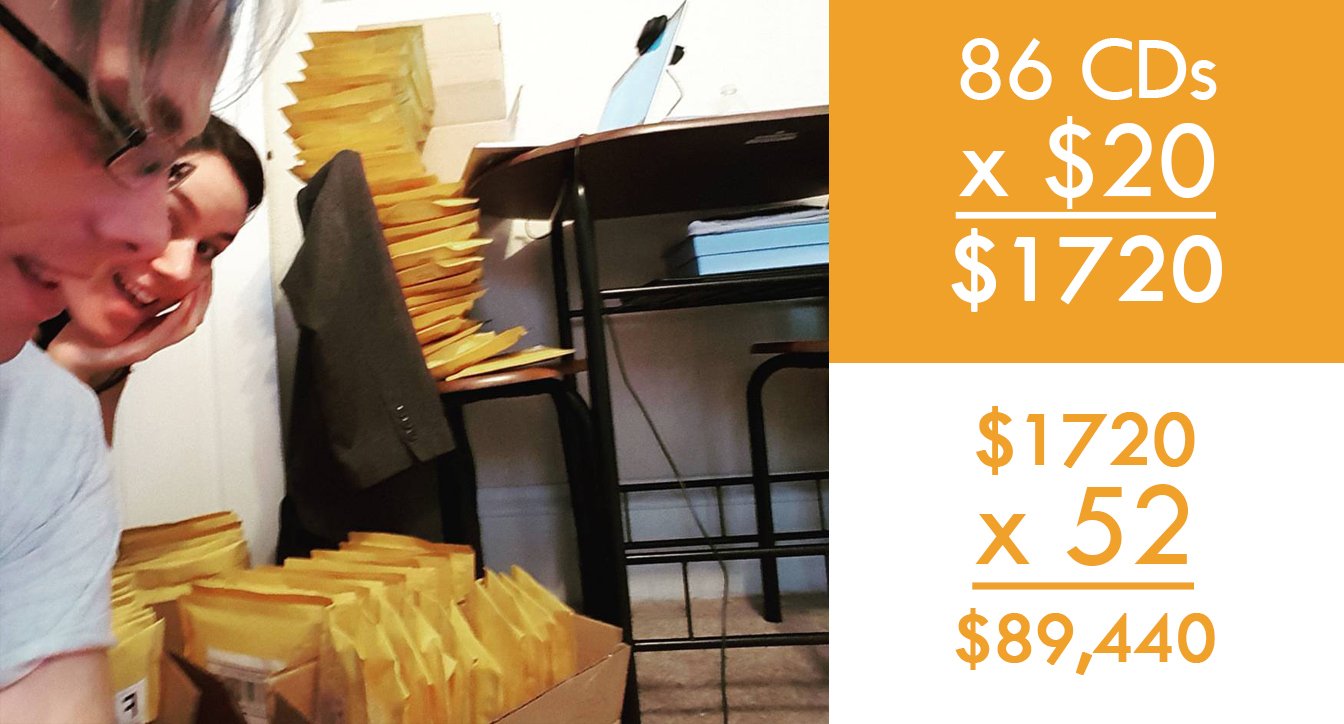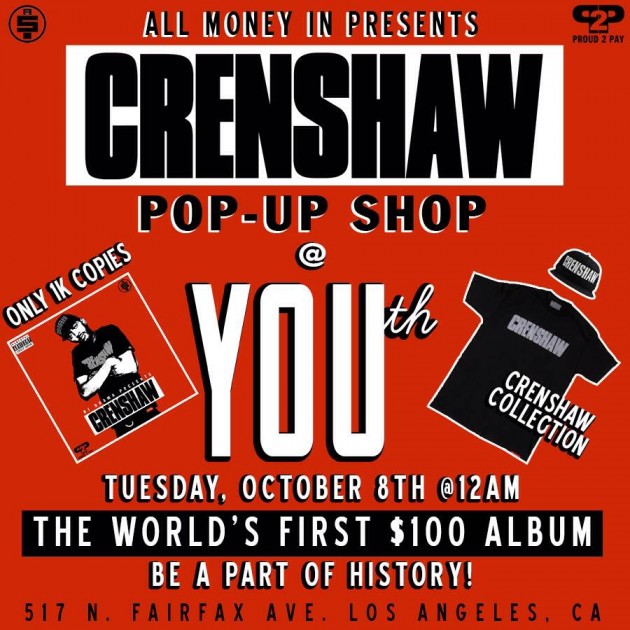How To Make A Fortune Off Of…. Selling CDs?

Quickly and easily deploy time-tested marketing campaigns with Indepreneur's INDIEPRO training library. Become an INDIEPRO member and learn how Indepreneur can help you break out of your current music scene, build a trackable fan base, and sell music and merchandise. Learn more now!
August 20th, 2017 by Circa
“Physical media is dead”…
“Digital downloads are the future”…
“Nobody buys CDs anymore”….
You’ve probably heard these claims oozing out of record industry mouths for the past decade. Ask any music industry blogger, record exec, A&R, or music tech company. They’ll tell you that CDs just don’t sell anymore.
And it makes sense – CD sales have been declining for over 10 years as revenues from digital downloads and streaming continue to climb. But they’re wrong.
I know they’re wrong because we’ve managed to help a single artist generate $3000+ per month for the last 4 months straight from the sale of physical CDs. So why is the industry telling us selling CDs is dead?
In this article, we’re going to explore the “why” behind this troubling myth and show you the math and psychology you’ll need to decide if printing CDs is a good fit for your career.
Major Label CD Sales Are Down

This is what bloggers mean when they say that “people don’t buy CDs anymore”. For the past 15 years, CD sales have been falling and digital music sales have been rising. That is, according to data from SoundScan and a number of other agencies that record industry sales data. But these statistics are mostly populated by Major Label sales figures – not independent music sales figures.
Independent music sales eclipse individual major record label music sales:
Also, not all independent musicians choose to report their CD sales to SoundScan. Of those that do, not all of them are able to record every transaction. So, a lot of data from independent music sales gets left out of this figure.
As a result, there is no way to isolate independent music sales data and track growth. But, it’s probably safe to assume that independent music sales don’t fluctuate based on format, because…
Fans Buy Music, Not Music Listeners
Lets look at things logically for a moment…
When people make audacious claims like “physical media is dead”, they are making a statistical statement about a large sample of the population. They are really saying “Physical CDs are being purchased less and less often”.
But, the people that buy music are not some mindless herd that operates off of simple, statistical rules.

People don’t just pop on down to the music store to pick up some music. Similarly, people don’t just decide one day to stop participating in a certain format of music.
Fans buy music. Fans of specific artists.
When the “experts” phrase it like this, the implied message is that music fans in general don’t want to buy CDs anymore. And THAT is the part that is bogus. Yes, CDs are being purchased less… but why is that?
If CD sales are falling, it can only be because the artists that represent a majority of music sales are selling less and less CDs. Why does somebody buy a physical CD? Why does somebody buy anything from an artist?
Nobody actually NEEDS to possess your music. For almost 20 years, music has been widely available for free on the internet. Before that, music could be recorded to tape from the radio. And, similarly, nobody actually NEEDS your band shirt. They probably have a closet full of shirts.
“People buy products from artists as a token of their relationship with that artist.”
So, when they say that “physical media is dead”, they are really saying that CD sales are down. And if CD sales are down, it’s because artists, specifically the big name artists that represent the largest chunks industry-wide sales, are not creating the type of relationship with their fans that inspires them to purchase products.
It can be very dangerous to make ridiculous claims like “physical media is dead”. Lady Gaga has a very strong relationship with her fan base. If she decides to put out her next album exclusively on cassette tape, do you think her “Little Monsters” won’t buy it?
Are they going to miss out on her latest artwork because they can only get it on cassette tape?

Of course not. To assume that would be ridiculous. They may even want it more, because now it has a layer of mystique and exclusivity. The point I’m making here is that the record industry appears to be following industry-wide data instead of leading it.
Which is why…
Music Streaming Services Do Not Replace CD Sales
The music industry and music industry bloggers often look at this as a war between digital music and physical media. It’s not. Streaming platforms and physical media like CDs and vinyls are two completely different types of products.
Understand that people buy CDs as a token of the relationship between them and the artist they follow, not because of a price or a format.

The music industry used to use CDs as a vehicle to force you to purchase the music to actually listen to it. That doesn’t mean that’s why people buy them. And, just because it doesn’t work for them anymore doesn’t mean you shouldn’t try to sell CDs.
Streaming is a ubiquitous source – I turn on Spotify and use playlists, radios, and recommendation algorithms to tailor a constant stream of music for my eardrums. I merely enjoy that which I love about artists by streaming their music I do not celebrate my love for artists by streaming their music. I do that by actually buying something from them or seeking some deeper level of connection with them.
This is one of the reasons why touring is rising along with streaming. Fans have access to more music from the artists they love. Since they can already listen to the CD, purchasing the CD seems arbitrary. So, they buy tour tickets. They buy band t-shirts. And the data supports this notion:

Which is why…
CDs Can Still Be Your Most Profitable Revenue Source
Let’s just look at the numbers here:
To print 1000 4-panel Digipak CDs with a 6-panel booklet insert, it will cost you roughly $1200. That’s $1.20 per CD.
Let’s assume it will cost you $2 in marketing and advertising to generate a sale for one of these CDs.
Then, let’s assume that the average retail value of the CD is $16.
For a $3200 investment, you would yield $16,000 in revenue. That is a 500% ROI.
That means that for every $1 you spend, you get $5 back.
There isn’t a single short-term investment opportunity in the world that can reliably yield that kind of ROI. With the production and marketing costs of t-shirts, hoodies, and yes, streaming, you could not find a better return on investment. CDs are still a viable and effective product.
The music industry does not have a product problem, and it certainly doesn’t have a traffic problem. The music industry has severe, career-ruining offer problems.

The music industry can’t make a compelling offer to save their own lives (or 70,000+ jobs). So, when it comes to marketing and selling your CD, it’s best to be creative.
Our Indies don’t just offer CDs – they offer autographed, personalized, and, in some cases, limited edition CDs. They offer bonus content with their CDs. They turn their CDs into Lifetime VIP Passes to all meet and greets.
The problem has never been the product. The problem is and has always been the offer. If you want to make a living selling CDs, you don’t need a Lady Gaga sized audience. You just need a small, die-hard, grass-roots fan base, and a really compelling offer.
Conclusion
Saying “CDS ARE DEAD!” is a great way to rack up blog hits and scare your market into trusting you. It also effectively hides the shortcomings and fuck-ups of major record label executives, A&Rs, and managers. It puts the blame of falling sales on technological advancement.
If you build a strong relationship with your listeners, they will support your music by making purchases, no matter the format. When it comes to the music business, it is rarely about the product you are selling. Your sales and profitability will live and die on the relationship you build with your audience and the offers you are creating for them.
You can make a silent fortune selling “dead” CDs.
Don’t believe the hype.
